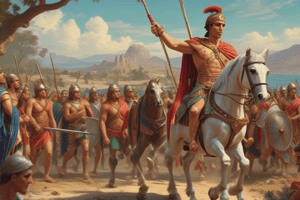Podcast
Questions and Answers
What marked the beginning of the Classical Age of Greece?
What marked the beginning of the Classical Age of Greece?
- The decline of Athenian power
- The birth of Alexander the Great
- The unification of city-states
- The decline of Babylonian (Persian) supremacy (correct)
At what age did Alexander the Great become king of Macedon?
At what age did Alexander the Great become king of Macedon?
- 30
- 20 (correct)
- 18
- 25
What was one major contribution of Hippocrates to medicine?
What was one major contribution of Hippocrates to medicine?
- Surgical techniques
- The theory of humors (correct)
- Pathogen discovery
- Anatomy descriptions
Which term describes the collection of city-states in ancient Greece?
Which term describes the collection of city-states in ancient Greece?
What significant impact did Alexander the Great have on Greek culture?
What significant impact did Alexander the Great have on Greek culture?
How many English words are estimated to be derived from Greek?
How many English words are estimated to be derived from Greek?
What feature distinguishes words in English derived from Greek?
What feature distinguishes words in English derived from Greek?
What contributed to Greek becoming the first Lingua Franca?
What contributed to Greek becoming the first Lingua Franca?
What does the term 'cemetery' derive from in Greek?
What does the term 'cemetery' derive from in Greek?
What is the origin of the word 'dynasty'?
What is the origin of the word 'dynasty'?
How did the word 'enthusiasm' evolve in meaning from its Greek roots?
How did the word 'enthusiasm' evolve in meaning from its Greek roots?
What two Greek words combine to form the term 'dinosaur'?
What two Greek words combine to form the term 'dinosaur'?
What event triggered the decline of Greece?
What event triggered the decline of Greece?
What impact did Alexander's death have on the future of Rome?
What impact did Alexander's death have on the future of Rome?
Which of the following words means 'jealous' and derives from a Greek root?
Which of the following words means 'jealous' and derives from a Greek root?
Study Notes
Ancient Greece and its Classical Age
- The Classical Age of Greece commenced around 500 B.C. with a significant decline in Persian dominance.
- Major figures in philosophy and science include Plato, Socrates, Democritus, and Pythagoras, who made profound advancements especially in mathematics and medicine.
- The Greeks excelled in art, producing renowned writers and sculptors whose works are celebrated worldwide.
City-States (Polis)
- Ancient Greece comprised various city-states (Polis), lacking a unified nation.
- These city-states shared language and culture but primarily united in response to common threats.
Alexander the Great (Alexander Magnus)
- Alexander, son of King Philip II of Macedon, became king at age 20.
- Launched a decade-long campaign, conquering vast territories and spreading Greek culture and language across major cities.
- Died at age 32, allegedly by poisoning.
Enduring Contributions of Ancient Greece
- Greek contributions span democracy, drama, philosophy, and medicine.
- Hippocrates, known as the “Father of Medicine,” profoundly influenced modern medical practices.
Greek Language Influence
- Greek is the first major Western language with a lasting legacy, forming a "Lingua Franca" for trade.
- Over 150,000 English words stem from Greek, especially terms beginning with 'ph-'.
- The modern English alphabet derives from the Roman alphabet, which is influenced by the Greek alphabet.
Notable Greek Words in English
- Cemetery: From Greek "koimitirion," meaning a place of rest or sleep.
- Dynasty: Derived from Greek "dinami," meaning strength or power.
- Enthusiasm: Originates from "enthousiasmós," meaning divine inspiration or possession.
- Jealous: Comes from the Greek word "zêlos."
- Dinosaur: A combination of "dinos" (terrible) and "saûros" (lizard).
Aftermath of Alexander's Death
- Alexander's passing at age 32 and lack of heirs led to the fracturing of his empire among his generals.
- This fragmentation initiated chaos as generals fought for control, diminishing the unified power of Greece.
- The decline of Greece allowed Rome to rise, adopting military strategies and cultural elements from the Greeks.
Studying That Suits You
Use AI to generate personalized quizzes and flashcards to suit your learning preferences.
Related Documents
Description
Explore the remarkable achievements of ancient Greece during the Classical Age, particularly focusing on the era of Alexander the Great. Delve into the contributions of philosophers, mathematicians, and artists who laid the foundations of Western civilization. This quiz will test your knowledge of key figures, cultural developments, and historical events in ancient Greece.




